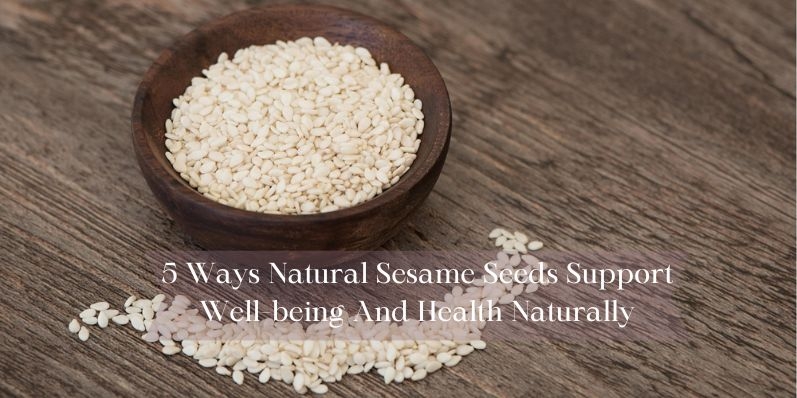
12-01-2024
5 Ways Natural Sesame Seeds Support Well-being And Health Naturally
- Admin
In the heart of Indonesia, where vibrant cultures and rich biodiversity intersect, lies a small but mighty seed that has been an integral part of traditional diets for centuries – sesame seeds. Beyond their culinary applications, these tiny seeds pack a nutritional punch, offering a plethora of health benefits. In this article, we delve into the 5 ways natural sesame seeds contribute to overall well-being and health, exploring their essential vitamins and minerals, role in cardiovascular wellness, impact on bone health, ability to fight free radicals, and their contribution to gut health and digestive wellness.
Essential Vitamins and Minerals in Sesame Seeds
Natural sesame seeds are a powerhouse of essential vitamins and minerals that play a crucial role in supporting overall health. Rich in nutrients such as calcium, magnesium, iron, and phosphorus, these seeds are an excellent addition to a balanced diet. In particular, calcium is essential for maintaining strong bones and teeth, while iron supports oxygen transportation in the blood. The abundance of these micronutrients in sesame seeds makes them a valuable dietary source for individuals of all ages, contributing to the prevention of nutritional deficiencies.
Furthermore, sesame seeds are a natural source of vitamin B complex, including niacin, thiamin, and riboflavin, which are vital for energy metabolism and the proper functioning of the nervous system. Incorporating sesame seeds into the diet can offer a convenient and delicious way to ensure the body receives these essential nutrients.
Role of Sesame Seeds in Cardiovascular Wellness
In the pursuit of a heart-healthy lifestyle, the inclusion of sesame seeds in one's diet can be particularly beneficial. These seeds contain a unique combination of compounds, including sesamin and sesamol, which have been associated with cardiovascular health benefits. Studies suggest that sesamin may contribute to reducing cholesterol levels, thereby lowering the risk of cardiovascular diseases.
The heart-protective properties of sesame seeds also extend to their high content of polyunsaturated fats, specifically omega-6 fatty acids. These healthy fats play a role in maintaining optimal cholesterol levels and supporting overall heart function. By incorporating natural sesame seeds into the diet, individuals in Indonesia can take a step towards promoting cardiovascular wellness, aligning with the principles of a heart-healthy lifestyle.
Sesame Seeds and Their Contribution to Bone Health
In Indonesia, where cultural diversity is as rich as the soil, maintaining strong and healthy bones is essential for individuals of all ages. Sesame seeds emerge as a natural ally in this endeavor, thanks to their impressive mineral profile. Calcium, phosphorus, magnesium, and zinc, all found abundantly in sesame seeds, are fundamental for bone health.
Calcium, as a primary component of bones, is crucial for maintaining bone density and strength. Meanwhile, phosphorus works in tandem with calcium to fortify bones and teeth. The addition of magnesium and zinc enhances the absorption of these minerals, contributing to the overall integrity of the skeletal system. Whether consumed as a topping on traditional dishes or incorporated into various recipes, sesame seeds offer a delicious way to fortify bone health in the Indonesian population.
Sesame Seeds' Impact on Fighting Free Radicals
In the lush landscapes of Indonesia, where nature's bounty is celebrated, combating free radicals becomes a priority for maintaining well-being. Sesame seeds, with their natural antioxidants, play a vital role in this fight against oxidative stress. These antioxidants, including sesamol and vitamin E, help neutralize free radicals, reducing the risk of chronic diseases and supporting overall health.
The protective properties of sesamol, specifically, extend to its potential anti-inflammatory effects. Inflammation is a common denominator in various health conditions, and sesame seeds offer a natural and delicious means to mitigate its impact. By incorporating these seeds into daily meals, individuals in Indonesia can harness the power of sesame's antioxidants to protect their cells and promote longevity.
How Sesame Seeds Contribute to Gut Health and Digestive Wellness
Indonesia's diverse culinary tapestry is woven with flavors and ingredients that not only tantalize the taste buds but also support digestive health. Sesame seeds, with their fiber content, contribute to a healthy digestive system. Dietary fiber aids in promoting regular bowel movements, preventing constipation, and supporting overall gut health.
Moreover, sesame seeds contain lignans, which have been associated with potential prebiotic effects. Prebiotics serve as food for the beneficial bacteria in the gut, fostering a balanced and thriving microbial environment. This, in turn, can contribute to improved digestion, nutrient absorption, and a strengthened immune system.
Conclusion
As we navigate the diverse landscapes and cultures of Indonesia, it becomes evident that the humble sesame seed holds immense potential in promoting well-being and health naturally. From essential vitamins and minerals to cardiovascular wellness, bone health, antioxidant properties, and digestive support, sesame seeds offer a holistic approach to nourishing the body.
Incorporating natural sesame seeds into the Indonesian diet not only enhances the culinary experience but also aligns with a tradition of embracing nature's gifts for optimal health. As we celebrate the rich heritage of Indonesia, let the versatile sesame seed stand as a symbol of the intersection between cultural traditions and the pursuit of well-being, reminding us that nature's bounty holds the key to a vibrant and healthy life